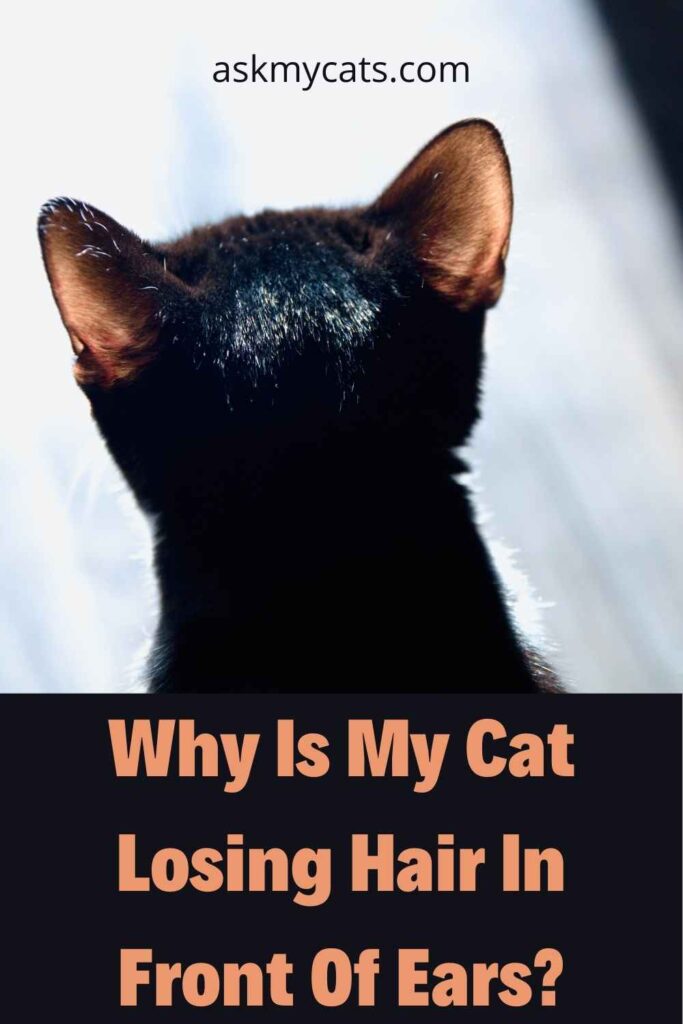Hair Loss In Cats On Ears - If you're a cat lover, you likely consider your feline friend as part the family. You want to keep them healthy, comfortable, and happy as possible. Unfortunately, cats can experience various health issues that can be challenging to identify and resolve. One of the most common health concerns among cats is hair loss, especially around their ears. Although it's not unusual for cats to shed hair, excessive or irregular hair loss can indicate underlying medical issues. In this post, we'll explore six possible reasons for hair loss in cats and some tips to help you prevent and address the problem.
1. Parasites
What Are Parasites?
Parasites are small creatures that feed on your cat's blood and cause irritation on their skin, leading to hair loss. The most common parasites that affect cats are fleas, ticks, and mites. These parasites can be challenging to identify as they aren't visible to the naked eye. However, if your cat excessively scratches their ears or shakes their head, it may be an indication of parasitic infestation.
How to Prevent Parasitic Infestation
To prevent parasite infestation on your cat's ears, consider using flea treatments and tick preventatives. These treatments prevent and eliminate pests such as fleas and ticks that cause skin irritation, leading to hair loss in cats. You can ask your vet for the best flea and tick treatments for your cat.
2. Fungal Infection
What Is a Fungal Infection?
A fungal infection, also known as ringworm, is a highly contagious fungal disease that can cause hair loss in cats' ears. The infections are caused by fungi that live and grow on the skin, leading to scaling and bald patches in the infected area.

How to Identify Fungal Infection
Fungal infections reduce your cat's immune system, leading to scaly, bald patches around their ears. The hair loss becomes visible in a circular shape, surrounded by red and crusty skin. It's vital to take quick action when you notice these symptoms to prevent the disease from spreading.
How to Treat Fungal Infection
To treat fungal infections, your veterinary may prescribe antifungal medications in the form of tablets, creams or at times, a combination of both. The treatment duration varies depending on the severity of the disease.
3. Trauma or Wound
What Is Trauma or Wound?
Marley, the cat, may sustain injuries from fights, scratches from rough play, or accidental bites. In such cases, they'll experience hair loss around their ears.

How to Treat Trauma or Wound
If your cat has any wounds or injuries, gently clean the affected area with warm water and mild soap. Dry the affected area thoroughly and avoid exposing Marley to dirty or rough surfaces that could cause further damage. If the damage is significant, it's best to contact your veterinarian for further medical attention.
4. Allergies
What Are Allergies?
Cats are prone to allergies, just as humans do. Allergies can cause Marley's hair to fall out from around his ears. In some cats, the hair loss can be accompanied by itching, which causes scratching, making the hair to fall out.

How to Treat Allergies
Most allergies are manageable, and your veterinarian can recommend antihistamines or steroids. When dealing with allergies, it's essential to identify what triggers Marley's allergic reactions and avoid exposing them to such substances. It's also crucial that you groom Marley regularly to help with shedding, which reduces the risk for allergies.
5. Skin Infections
What Are Skin Infections?
Marley's skin may be infected by bacteria or other microorganisms causing hair loss. Skin infections commonly occur alongside allergies or trauma, leading to a weakening immune system which increases the likeliness of bacteria on the skin.

How to Treat Skin Infections
If you suspect Marley has skin infection, see your veterinarian for a proper diagnosis before starting any medication. Treatment may involve antibiotics, antifungal, or antiparasitic medication depending on the cause of the infection. Additionally, if the hair loss is significant, clipping the cat's fur may be necessary.
6. Hormonal Imbalance
What Is Hormonal Imbalance?
In some rare cases, hair loss may be the result of a hormonal imbalance. Hormonal imbalances are more commonly seen in older cats and female cats during their pregnancy or nursing period. If your cat loses hair due to a hormonal imbalance, the hair will grow back once the cause of the imbalance is corrected.
How to Treat Hormonal Imbalance
The best way to deal with hormonal imbalance is by determining its underlying cause. Your veterinarian may recommend further tests to identify the root cause of the imbalance. If Marley's hormonal imbalance is to do with their pregnancy period or loss, the hair on the ears will usually grow back after a few months after delivering the kittens or lactating period.
Conclusion
Hair loss can be a frustrating experience for cat owners. Although it can be challenging to pinpoint the cause of hair loss in cats' ears, a proper diagnosis from a veterinarian can lead to a better understanding and treatment. By practicing regular grooming and cleansing habits and knowing the early signs of hair loss, you will be both proactive and reactive in Marley's health. Take care of Marley's hair, and they will remain happy, healthy, and comfortable for years to come.
Read more articles about Hair Loss In Cats On Ears